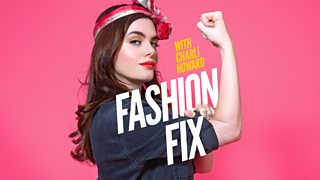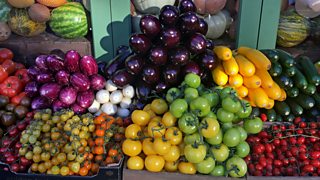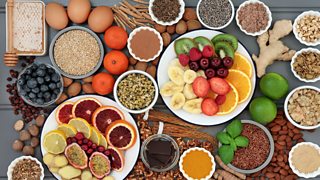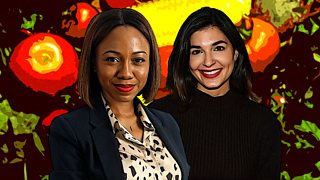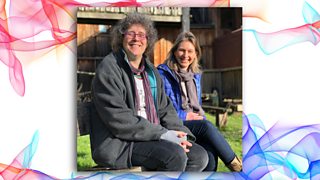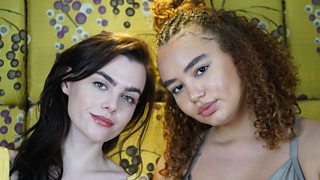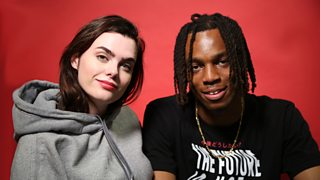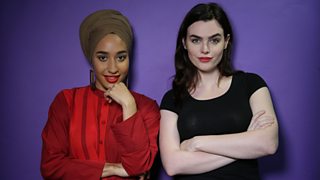Can you be vegan and still love fashion?
On this episode of Fashion Fix Charli Howard finds out about veganism and fashion with actor, activist and podcaster Evanna Lynch. You might know her as Luna Lovegood in the Harry Potter films. She’s been vegan since 2013, was a vegetarian from the age of 11 and loves her fashion. Here are a few of the things we learned from their meeting. Listen to the episode here.
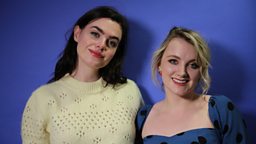
What is vegan fashion?
“It's just basically not wearing any animal products,” explains Evanna. “People think about their diet first, but there's so many materials that are made of animal skins… So leather is a big one that's animal skin, fur is obviously one, that's a big one...silk and feather down that'll be in coats as well. Any material that is made from an animal is a no no. It's just trying to show that animals are not commodities, they're not machine parts that you just pick apart and use for your own gain. We have technology where we can make better products now and they are of the same quality.”
What inspired Evanna to become vegan?
Like many vegans Evanna started out by becoming a vegetarian first at the age of 11. As she explains to Charlii: “I really just disagreed with animals being killed and as soon as I found out that you could live without them, I was like, yeah, I'm in. But then I didn't go vegan because I just thought that was too extreme. I thought it was really radical, and my mum would tell me those things as well.”
But becoming more involved in animal rights online made Evanna question her diet, as did reading Jonathan Safran Foer’s book Eating Animals about the ethics of meat farming and its consumption. The book is, says Evanna: “about what's going on in the factory farms. And I think I just felt like if I can't read this, I certainly can't look at it and I can't imagine what it must be like to go through it. So I just found out I agreed… with vegan ideology. I found at heart I am vegan, I was vegan, I just didn't have the practice. It’s like we're not raised in a world with veganism and vegetarianism. It's annoying that the default is you’re raised to eat meat and animal products and to believe that that's normal, that that's the only way. You know, like parents get criticised and get told, ‘Oh, you're brainwashing your children if you're feeding them vegan. Or, why are you forcing your values?’ [But] eating meat is also a value.”
What about things made out of wool? The sheep isn’t being killed - what’s the problem with that?
“The vegan ideology is that we shouldn't be using any part of the animals - it's not ours, it doesn't belong to us,” says Evanna. “When an animal is being used for its parts, you just can't guarantee that its welfare is going to be honoured. I appreciate it if people go out of their way to try and find more ethical solutions - I understand that. I personally just would be like, I disagree with the commodification of animals, so it's almost simpler to say ‘vegan’ and not have these things.”
What about the environmental impact of vegan options made from plastic?
“Do your best where possible to pick sustainable options and pick things that you’ll wear again… the PU (Polyurethane) stuff is obviously not a very environmentally friendly fabric. If you’re gonna buy those things, just think really carefully- ‘am I gonna use it, is it going to support my life and am I going to try and do some good things with my life to even out all the waste I’m producing?!’…If you want the more sustainable investment pieces, you do have to spend a little bit more…Of course when you go vegan you do have to be more mindful of where they come from, what you’re consuming but you have to get out of this mentality that you can have everything.”
Vegan up your wardrobe
On the podcast Evanna shares some things to think about and some tips. She says that it’s important to do your research and understand your subject so you can make your vegan choices a positive thing: “I always say with veganism you have to make it about choice rather than obligation. I definitely felt that when I first went vegan, there was pressure, like you should be vegan, you should be doing this and I was doing it out of guilt rather than willingness.”
There are leather and fur alternatives that don’t use animal products, like imitation leather made from pineapple leaves that the two talk about in this episode, together with the practicalities of what to do with leather products you might already have and what Evanna did with the designer handbags she’d bought as a teenager.
And finally, one last piece of advice from Evanna - how do you deal with people who disagree with you? “I definitely would say it is most hard with friends and family,” says Evanna. “The main thing is to never ever judge someone and humility is the cornerstone of speaking to other people. Because it's impossible to know everything, and I think it's good to focus on the good in them, what you love about them, what you admire about them and speak to that and then a positive conversation can happen.”
More from Fashion Fix
-
![]()
What makes ethical dress sense for people and planet?
Model Charli Howard shows us how to be sustainable and stylish with the podcast that fixes fashion while fixing the world.
Listen on 麻豆社 Sounds...
-
![]()
Body Positivity with Sonny Turner
Charli sets off on her mission to fix fashion with a look at body image.
-
![]()
Sustainable Streetwear with Emmanuel Enemokwu
Charli discovers a new breed of sustainable brands.
-
![]()
Modest Fashion with Mariah Idrissi
Charli meets the model who made modest fashion mainstream.
-
![]()
Subscribe to Fashion Fix with Charli Howard
Get the latest from Fashion Fix on 麻豆社 Sounds.
